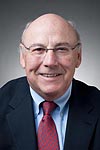Martin names DeLuca as UW-Madison provost
Paul M. DeLuca Jr., vice dean of the UW–Madison School of Medicine and Public Health (SMPH), was named the university’s provost and vice chancellor for academic affairs today (June 11) by Chancellor Biddy Martin.

DeLuca
“Paul DeLuca is an outstanding scientist and a respected academic leader who has devoted himself over decades to our university and its core missions. He has helped lead significant change and growth in the School of Medicine and Public Health. He is known to be a remarkably strategic thinker, a person with great integrity and a generous colleague,” says Martin. “He also has a great sense of humor.”
As the chief academic officer, the provost is responsible for helping articulate and implement the institution’s long-term goals in research and education, through close collaboration with the chancellor and the deans of UW–Madison’s 13 schools and colleges. The provost’s office is also responsible for faculty and staff programs, diversity initiatives and enrollment management; and the provost is the point person for shared governance. In the absence of the chancellor, the provost acts as the university’s chief executive.
“It is an exceptional privilege to serve this outstanding university. We are well-positioned to achieve even greater accomplishments. This position is an opportunity to guide and assist this exceptional process,” says DeLuca, who also serves as associate dean for research and graduate studies at SMPH. “How many people have the opportunity to help lead an organization of this caliber? It is a fabulous honor and wonderful challenge.”
DeLuca came to UW–Madison after receiving his Ph.D. in nuclear physics from the University of Notre Dame. Following a postdoctoral research fellowship at UW–Madison, he joined the faculty in 1973 as an assistant scientist in what was then the medical physics division of the radiology department. In 1985, he became a full professor in what is now called the Department of Medical Physics, subsequently serving as chair for more than 10 years.
DeLuca has a long and distinguished tenure at UW–Madison and is an internationally recognized expert in high-energy particle radiation effects on humans, and also holds a faculty appointment in engineering physics.
He served as vice chair of the Department of Medical Physics from 1982-87, as its chair from 1987-98 and helped lead its growth from a small group of faculty into one of the medical school’s largest basic-science departments. In 1999, he was named associate dean at the school; the title of vice dean was added in 2001.
DeLuca’s scientific research has focused primarily on the various applications of physics to the diagnosis and treatment of cancer. As vice dean of the School of Medicine and Public Health, he played a key role in developing the physical and intellectual infrastructure for the health-sciences campus. He was integral to the creation of the Wisconsin Institutes for Medical Research (WIMR), an innovative complex that brings together scientists who approach particular diseases from a broad variety of perspectives. WIMR’s goal is to break down traditional barriers to collaboration and synergism, speeding the search for treatments and cures for human disease. The first WIMR tower, largely devoted to cancer research, opened in the fall of 2008; two additional towers are planned.
Widely published, DeLuca has served on many key campus committees engaged in academic and facilities planning. He chaired the HealthStar Oversight Committee from 1996-98 and currently serves as the director of the WIMR.
DeLuca earned his bachelor’s degree in physics and mathematics at Le Moyne College in Syracuse, N.Y.
“Paul’s experience at UW–Madison, his knowledge of the campus and its constituencies, and his leadership, not only on the campus, but also in national and international professional settings, will make him a strong provost and invaluable partner,” Martin says.
Julie Underwood, dean of the School of Education, has served as interim provost since the end of fall semester 2008, when former Provost Patrick Farrell returned to the faculty. Farrell subsequently was named provost at Lehigh University. Underwood will return to lead the School of Education.
“I am extremely grateful to Julie for her outstanding leadership over the past six months,” says Martin. “Her tireless efforts and contributions to a large number of major projects — the strategic framework, the Madison Initiative, biosafety and improved institutional processes — will have a lasting impact on the campus, which is deeply indebted to her for stepping in, taking hold of the challenges, and so generously giving of her talent and energy to address them. I have loved working with her, and am in awe of what she accomplished in an interim role.”
DeLuca was chosen following a review by a search-and-screen committee and interviews with the chancellor, campus administrators, representatives of shared governance groups, and officials representing campus partners such as the Wisconsin Alumni Association, the Wisconsin Alumni Research Foundation and the UW Foundation.
In addition to DeLuca, the search-and-screen committee recommended Irwin L. Goldman, vice dean and associate dean for research at the College of Agricultural and Life Sciences at UW–Madison, and Richard L. Moss, chair of the Department of Physiology in the UW–Madison School of Medicine and Public Health.




